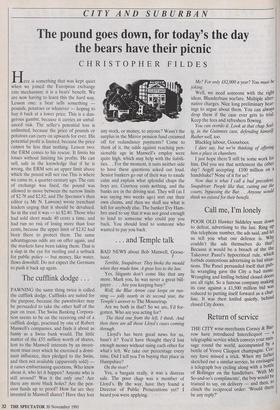CITY AND SUBURBAN
The pound goes down, for today's the day the bears have their picnic
CHRISTOPHER FILDES
Here is something that was kept quiet when we joined the European exchange rate mechanism: it is a bears' benefit. We are now having to learn this the hard way. Lesson one: a bear sells something pounds, potatoes or whatever — hoping to buy it back at a lower price. This is a dan- gerous gambit, because it carries an unbal- anced risk. The seller's potential loss is unlimited, because the price of pounds or potatoes can carry on upwards for ever. His potential profit is limited, because the price cannot be less than nothing. Lesson two: the ERM comes to his rescue. It limits his losses without limiting his profits. He can sell, safe in the knowledge that if he is wrong, the ERM sets an upper limit above which the pound will not rise.This is where we came in, a quarter-century ago. The rate of exchange was fixed, the pound was allowed to move between the narrow limits of $2.78 and $2.82, and The Spectator's then editor (a Mr N. Lawson) wrote trenchant leaders urging that it should be devalued. So in the end it was — to $2.40. Those who had sold short made 40 cents a time, and had run no risk of losing more than four cents, because the upper limit of $2.82 had been there to protect them. The same advantageous odds are on offer again, and the markets have been taking them. That is a slap in the eye for sterling and a setback for public policy — but money, like water, flows downhill. Do not expect the Germans to push it back up again.










































































 Previous page
Previous page